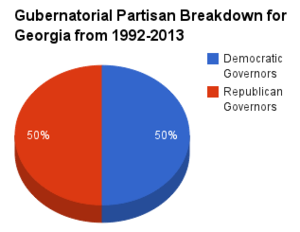Governor of Georgia
| Georgia Governor | |
 | |
| General information | |
| Office Type: | Partisan |
| Office website: | Official Link |
| Compensation: | $180,000 |
| 2025 FY Budget: | $6,904,362 |
| Term limits: | 2 consecutive terms |
| Structure | |
| Length of term: | 4 years |
| Authority: | Article V, Section 1 |
| Selection Method: | Elected |
| Current Officeholder(s) | |
Governor of Georgia
Brian Kemp | |
| Elections | |
| Next election: | 2026 |
| Last election: | 2022 |
| Other Georgia Executive Offices | |
| Governor•Lieutenant Governor•Secretary of State•Attorney General•Treasurer•Auditor•Superintendent of Schools•Agriculture Commissioner•Insurance Commissioner•Natural Resources Commissioner•Labor Commissioner•Public Service Commission | |
The Governor of the State of Georgia is an elected constitutional officer, the head of the executive branch and the highest state office in Georgia. The governor is popularly elected every four years by a plurality and is limited to two consecutive terms. No individual may again hold the office again until four years, a single gubernatorial term, have elapsed.[1]
Georgia has a Republican trifecta. The Republican Party controls the office of governor and both chambers of the state legislature.
Georgia has a Republican triplex. The Republican Party controls the offices of governor, secretary of state, and attorney general.
Current officeholder
The current Governor of Georgia is Brian Kemp (R). Kemp assumed office in 2019.
Authority
The state constitution addresses the office of the governor in Article V, the Executive Department.
Georgia Constitution, Article V, Section 1, Paragraph I
|
There shall be a Governor...[1] |
Georgia Constitution, Article V, Section 2, Paragraph I
|
The chief executive powers shall be vested in the Governor[1] |
Qualifications
| State Executives |
|---|
| Current Governors |
| Gubernatorial Elections |
| 2026 • 2025 • 2024 • 2023 • 2022 • 2021 • 2020 • 2019 • 2018 • 2017 • 2016 • 2015 • 2014 |
| Current Lt. Governors |
| Lt. Governor Elections |
| 2026 • 2025 • 2024 • 2023 • 2022 • 2021 • 2020 • 2019 • 2018 • 2017 • 2016 • 2015 • 2014 |
Per Article V, Section 1 of the state constitution, the governor must be at least 30 years old on the day he or she assumes office and, on the day he or she is elected, have been a resident of Georgia for at least six years and an American citizen for at least 15 years.
Georgia Constitution, Article V, Section 1, Paragraph IV
|
No person shall be eligible for election to the office of Governor or Lieutenant Governor unless such person shall have been a citizen of the United States 15 years and a legal resident of the state six years immediately preceding the election and shall have attained the age of 30 years by the date of assuming office. [1] |
Elections
- See also: Gubernatorial election cycles by state
- See also: Election of governors
Georgia elects governors in the midterm elections, that is, even years that are not presidential election years. For Georgia, 2018, 2022, 2026, 2030, and 2034 are all gubernatorial election years. Legally, the gubernatorial inauguration is always set for the same day that the Georgia General Assembly convenes. Future inaugurations will occur on the day fixed by legislature to convene itself.
Term limits
- See also: States with gubernatorial term limits
Georgia governors are restricted to two consecutive terms in office, after which they must wait four years before being eligible to run again.
Georgia Constitution, Article V, Section 1, Paragraph 1
| Persons holding the office of Governor may succeed themselves for one four-year term of office. Persons who have held the office of Governor and have succeeded themselves as herein before provided shall not again be eligible to be elected to that office until after the expiration of four years from the conclusion of their term as Governor.[1] |
Partisan composition
The chart below shows the partisan breakdown of Georgia governors from 1992 to 2013.
Election results
See also: Georgia gubernatorial election, 2030
There are no official candidates yet for this election.
See also: Georgia gubernatorial election, 2026
General election
The primary will occur on May 19, 2026. The general election will occur on November 3, 2026. General election candidates will be added here following the primary.
Democratic primary
Democratic primary for Governor of Georgia
The following candidates are running in the Democratic primary for Governor of Georgia on May 19, 2026.
Candidate | ||
 | Keisha Bottoms | |
 | Olu Brown | |
 | Geoff Duncan | |
 | Jason Esteves | |
 | Derrick Jackson | |
 | Ruwa Romman | |
 | Michael Thurmond | |
 = candidate completed the Ballotpedia Candidate Connection survey. = candidate completed the Ballotpedia Candidate Connection survey. | ||||
| If you are a candidate and would like to tell readers and voters more about why they should vote for you, complete the Ballotpedia Candidate Connection Survey. | ||||
Do you want a spreadsheet of this type of data? Contact our sales team. | ||||
Republican primary
Republican primary for Governor of Georgia
The following candidates are running in the Republican primary for Governor of Georgia on May 19, 2026.
Candidate | ||
 | Chris Carr | |
 | Clark Dean | |
 | Rick Jackson | |
 | Burt Jones | |
 | Gregg Kirkpatrick  | |
Leland Olinger II  | ||
 | Brad Raffensperger | |
| Kenneth Yasger | ||
 = candidate completed the Ballotpedia Candidate Connection survey. = candidate completed the Ballotpedia Candidate Connection survey. | ||||
| If you are a candidate and would like to tell readers and voters more about why they should vote for you, complete the Ballotpedia Candidate Connection Survey. | ||||
Do you want a spreadsheet of this type of data? Contact our sales team. | ||||
See also: Georgia gubernatorial election, 2022
General election
General election for Governor of Georgia
Incumbent Brian Kemp (R) defeated Stacey Abrams (D), Shane Hazel (L), David Byrne (Independent), and Milton Lofton (Independent) in the general election for Governor of Georgia on November 8, 2022.
Candidate | % | Votes | ||
| ✔ |  | Brian Kemp (R) | 53.4 | 2,111,572 |
 | Stacey Abrams (D) | 45.9 | 1,813,673 | |
 | Shane Hazel (L) | 0.7 | 28,163 | |
 | David Byrne (Independent) (Write-in) | 0.0 | 18 | |
| Milton Lofton (Independent) (Write-in) | 0.0 | 7 | ||
| Total votes: 3,953,433 | ||||
 = candidate completed the Ballotpedia Candidate Connection survey. = candidate completed the Ballotpedia Candidate Connection survey. | ||||
| If you are a candidate and would like to tell readers and voters more about why they should vote for you, complete the Ballotpedia Candidate Connection Survey. | ||||
Do you want a spreadsheet of this type of data? Contact our sales team. | ||||
Withdrawn or disqualified candidates
- Elbert Bartell (Independent)
- President Boddie (Independent)
Democratic primary
Democratic primary for Governor of Georgia
Stacey Abrams (D) advanced from the Democratic primary for Governor of Georgia on May 24, 2022.
Candidate | % | Votes | ||
| ✔ |  | Stacey Abrams | 100.0 | 727,168 |
| Total votes: 727,168 | ||||
 = candidate completed the Ballotpedia Candidate Connection survey. = candidate completed the Ballotpedia Candidate Connection survey. | ||||
| If you are a candidate and would like to tell readers and voters more about why they should vote for you, complete the Ballotpedia Candidate Connection Survey. | ||||
Do you want a spreadsheet of this type of data? Contact our sales team. | ||||
Republican primary
Republican primary for Governor of Georgia
Incumbent Brian Kemp (R) defeated David Perdue (R), Kandiss Taylor (R), Catherine Davis (R), and Tom Williams (R) in the Republican primary for Governor of Georgia on May 24, 2022.
Candidate | % | Votes | ||
| ✔ |  | Brian Kemp | 73.7 | 888,078 |
 | David Perdue | 21.8 | 262,389 | |
 | Kandiss Taylor | 3.4 | 41,232 | |
 | Catherine Davis  | 0.8 | 9,788 | |
| Tom Williams | 0.3 | 3,255 | ||
| Total votes: 1,204,742 | ||||
 = candidate completed the Ballotpedia Candidate Connection survey. = candidate completed the Ballotpedia Candidate Connection survey. | ||||
| If you are a candidate and would like to tell readers and voters more about why they should vote for you, complete the Ballotpedia Candidate Connection Survey. | ||||
Do you want a spreadsheet of this type of data? Contact our sales team. | ||||
Withdrawn or disqualified candidates
- Vernon Jones (R)
See also: Georgia gubernatorial election, 2018
General election
General election for Governor of Georgia
Brian Kemp (R) defeated Stacey Abrams (D) and Ted Metz (L) in the general election for Governor of Georgia on November 6, 2018.
Candidate | % | Votes | ||
| ✔ |  | Brian Kemp (R) | 50.2 | 1,978,408 |
 | Stacey Abrams (D) | 48.8 | 1,923,685 | |
 | Ted Metz (L) | 0.9 | 37,235 | |
| Total votes: 3,939,328 (100% precincts reporting) | ||||
 = candidate completed the Ballotpedia Candidate Connection survey. = candidate completed the Ballotpedia Candidate Connection survey. | ||||
| If you are a candidate and would like to tell readers and voters more about why they should vote for you, complete the Ballotpedia Candidate Connection Survey. | ||||
Do you want a spreadsheet of this type of data? Contact our sales team. | ||||
Withdrawn or disqualified candidates
- Larry Odom (Independent)
Republican primary runoff
Republican primary runoff for Governor of Georgia
Brian Kemp (R) defeated Casey Cagle (R) in the Republican primary runoff for Governor of Georgia on July 24, 2018.
Candidate | % | Votes | ||
| ✔ |  | Brian Kemp | 69.5 | 406,703 |
 | Casey Cagle | 30.5 | 178,893 | |
| Total votes: 585,596 | ||||
 = candidate completed the Ballotpedia Candidate Connection survey. = candidate completed the Ballotpedia Candidate Connection survey. | ||||
| If you are a candidate and would like to tell readers and voters more about why they should vote for you, complete the Ballotpedia Candidate Connection Survey. | ||||
Do you want a spreadsheet of this type of data? Contact our sales team. | ||||
Democratic primary
Democratic primary for Governor of Georgia
Stacey Abrams (D) defeated Stacey Evans (D) in the Democratic primary for Governor of Georgia on May 22, 2018.
Candidate | % | Votes | ||
| ✔ |  | Stacey Abrams | 76.4 | 424,305 |
 | Stacey Evans | 23.6 | 130,784 | |
| Total votes: 555,089 | ||||
 = candidate completed the Ballotpedia Candidate Connection survey. = candidate completed the Ballotpedia Candidate Connection survey. | ||||
| If you are a candidate and would like to tell readers and voters more about why they should vote for you, complete the Ballotpedia Candidate Connection Survey. | ||||
Do you want a spreadsheet of this type of data? Contact our sales team. | ||||
Republican primary
Republican primary for Governor of Georgia
Casey Cagle (R) and Brian Kemp (R) advanced to a runoff. They defeated Hunter Hill (R), Clay Tippins (R), and Michael Williams (R) in the Republican primary for Governor of Georgia on May 22, 2018.
Candidate | % | Votes | ||
| ✔ |  | Casey Cagle | 39.0 | 236,987 |
| ✔ |  | Brian Kemp | 25.5 | 155,189 |
 | Hunter Hill | 18.3 | 111,464 | |
 | Clay Tippins | 12.2 | 74,182 | |
 | Michael Williams | 4.9 | 29,619 | |
| Total votes: 607,441 | ||||
 = candidate completed the Ballotpedia Candidate Connection survey. = candidate completed the Ballotpedia Candidate Connection survey. | ||||
| If you are a candidate and would like to tell readers and voters more about why they should vote for you, complete the Ballotpedia Candidate Connection Survey. | ||||
Do you want a spreadsheet of this type of data? Contact our sales team. | ||||
Withdrawn or disqualified candidates
- Eddie Hayes (R)
- Marc Alan Urbach (R)
Vacancies
- See also: How gubernatorial vacancies are filled
Details of vacancy appointments are addressed under Section I, Paragraph V of the Georgia Constitution
At any point that the governor or governor-elect is temporarily or permanently unable to discharge the office, the lieutenant governor or the lieutenant governor-elect assumes the office with all its powers and responsibilities.
In cases where the governor is permanently unable to fulfill the duties of the office, the lieutenant governor, as acting governor, will in most cases hold the office until the next general election. If the former officeholder's term is set to expire less than 90 days after the next election (in other words, if it is the last year of the former governor's term) and when the governorship is left vacant less than 30 days before a general election, the lieutenant governor simply completes the elected term.
If both the governor and lieutenant governor vacate their seats, the Speaker of the House of Representatives schedules a special election and serves as acting governor until that date.
Removing a constitutional officer for disability is governed by Article V, Section IV. Any four constitutional officers may petition the Georgia Supreme Court regarding the fitness for office of a fifth officer. That officer shall have a hearing with the testimony of no less than three board-certified physicians, one of whom must be a psychiatrist, before being deemed unfit or removed. The Supreme Court may make a determination of either temporary or permanent disability; in the case of the former, they shall also determine when the governor may resume the office.
Duties
The governor has a number of powers in state government, set forth primarily in Article V, Section II, Paragraphs II - X of the constitution, including proposing new programs and laws for the state, proposing a state budget for the legislature to consider, vetoing legislation, and appointing members of many of the boards in state government.
The governor is both the "conservator of peace" and the "commander-in-chief of the military forces" within Georgia; he or she is also charged with upholding and executing all laws. There is a gubernatorial veto, which the legislature may override by a two-thirds majority in both chambers. At the start of each regular legislative session and at other times if he or she deems it prudent, the governor delivers a 'State of the State' to the General Assembly and makes recommendations for laws.[1]
Other duties and privileges of the office include:
- Convening extraordinary sessions of the Assembly, not to exceed 40 days, as well as emergency sessions.
- Filling vacancies in all offices where the manner is not otherwise prescribed, subject to Senate confirmation.
- Requiring information from other constitutional officers and members of the executive on any aspects of their jobs and duties.
A majority of executive departments are headed by policy-making boards, whose members are appointed by the governor and confirmed by the Georgia State Senate. Usually, the boards appoint a department director or commissioner in cooperation with the governor to administer agency affairs. A few department heads are appointed directly by the governor.
Divisions
Note: Ballotpedia's state executive officials project researches state official websites for information that describes the divisions (if any exist) of a state executive office. That information for the Governor of Georgia has not yet been added. After extensive research we were unable to identify any relevant information on state official websites. If you have any additional information about this office for inclusion on this section and/or page, please email us.
State budget
Role in state budget
- See also: Georgia state budget and finances
The state operates on an annual budget cycle. The sequence of key events in the budget process is as follows:[3]
- In July of the year preceding the start of the new fiscal year, the governor sends budget instructions to state agencies.
- In September, agencies submit their budget requests to the governor.
- Budget hearings are held with the public in January through February.
- In January, the governor submits his or her proposed budget to the state legislature.
- The legislature adopts a budget in March or April, effective for the fiscal year beginning on July 1. A simple majority is required to pass a budget.
The governor is constitutionally required to submit a balanced budget to the legislature. In turn, the legislature must pass a balanced budget, and any budget signed into law by the governor must be balanced.[3]
Georgia is one of 44 states in which the governor has line item veto authority.[3][4]
Governor's office budget
The budget for the Office of the Governor in Fiscal Year 2025 was $6,904,362.[5]
Compensation
The salaries of elected executive officials in Georgia are determined by state law as mandated in the Georgia Constitution. Article V of the state constitution indicates that the Georgia State Legislature determines salaries for governor, lieutenant governor and "other elected executives."[6]
Article V, Section 3, Paragraph III
| Text of Paragraph III:
Powers, Duties, Compensation, and Allowances of Other Executive Officers Except as otherwise provided in this Constitution, the General Assembly shall prescribe the powers, duties, compensation, and allowances of the above executive officers and provide assistance and expenses necessary for the operation of the department of each.[6] |
2023
In 2023, the officer's salary was $180,000, according to the Council of State Governments.[7]
2022
In 2022, the officer's salary was $175,000, according to the Council of State Governments.[8]
2021
In 2021, the governor received a salary of $175,000, according to the Council of State Governments.[9]
2020
In 2020, the governor received a salary of $175,000, according to the Council of State Governments.[10]
2019
In 2019, the governor received a salary of $175,000, according to the Council of State Governments.[11]
2018
In 2018, the governor received a salary of $139,339, according to the Council of State Governments.[12]
2017
In 2017, the governor received a salary of $139,339, according to the Council of State Governments.[13]
2016
In 2016, the governor received a salary of $139,339, according to the Council of State Governments.[14]
2015
In 2015, the governor received a salary of $139,339, according to the Council of State Governments.[15]
2014
In 2014, the governor received a salary of $139,339, according to the Council of State Governments.[16]
2013
In 2013, the governor received a salary of $139,339, according to the Council of State Governments.[17]
2010
In 2010, the governor received a salary of $139,339, according to the Council of State Governments.
History
Partisan balance 1992-2013
From 1992-2013, Georgia had Democratic governors in office for the first 11 years while there were Republican governors in office for the last 11 years, including the last 11. During the final nine years of the study, Georgia was under Republican trifectas.
Across the country, there were 493 years of Democratic governors (44.82 percent) and 586 years of Republican governors (53.27 percent) from 1992 to 2013.
Over the course of the 22-year study, state governments became increasingly more partisan. At the outset of the study period (1992), 18 of the 49 states with partisan legislatures had single-party trifectas and 31 states had divided governments. In 2013, only 13 states had divided governments, while single-party trifectas held sway in 36 states, the most in the 22 years studied.
The chart below shows the partisan composition of the Office of the Governor of Georgia, the Georgia State Senate and the Georgia House of Representatives from 1992 to 2013.
SQLI and partisanship
Georgia was one of eight states to demonstrate a dramatic partisan shift in the 22 years studied. A dramatic shift was defined by a movement of 40 percent or more toward one party over the course of the study period.
The chart below depicts the partisanship of the Georgia state government and the state's SQLI ranking for the years studied. For the SQLI, the states were ranked from 1-50, with 1 being the best and 50 the worst. Georgia experienced two long periods of trifecta government, both Democratic and Republican, between the years 1992 and 2002 (Democratic) and again between the years 2002 and 2013 (Republican). The state’s lowest SQLI ranking occurred in 1992 (40th) under a Democratic trifecta, while its highest SQLI ranking occurred in 2007 (20th) under a Republican trifecta. Georgia experienced only two years of divided government, in 2003 and 2004, when the state house was under Democratic control. The state experienced its largest jump in the SQLI ranking between 2000 and 2001 (from 33rd to 27th) under a Democratic trifecta.
- SQLI average with Democratic trifecta: 33.27
- SQLI average with Republican trifecta: 22.75
- SQLI average with divided government: 27.00
Historical officeholders
There have been 70 governors in Georgia since 1788.[18] [19]
| # | Name | Took office | Left office | Party |
|---|---|---|---|---|
| 14 | George Mathews | 1788 | 1788 | Jeffersonian Republican |
| 15 | George Handley | 1788 | 1789 | None |
| 16 | George Walton | 1789 | 1789 | Jeffersonian Republican |
| 17 | Edward Telfair | 1789 | 1793 | Jeffersonian Republican |
| 18 | George Mathews | 1793 | 1796 | Jeffersonian Republican |
| 19 | Jared Irwin | 1796 | 1798 | Democratic-Republican |
| 20 | James Jackson | 1798 | 1801 | Democratic-Republican |
| 21 | David Emanuel | 1801 | 1801 | Democratic-Republican |
| 22 | Josiah Tattnall | Democratic-Republican | ||
| 23 | John Milledge | Democratic-Republican | ||
| 24 | Jared Irwin | 1806 | 1809 | Democratic-Republican |
| 25 | David B. Mitchell | Democratic-Republican | ||
| 26 | William Rabun | Democratic-Republican | ||
| 27 | Matthew Talbot | Democratic-Republican | ||
| 28 | John Clark | Democratic-Republican | ||
| 29 | George M. Troup | Democratic-Republican | ||
| 30 | John Forsyth | Democratic-Republican | ||
| 31 | George R. Gilmer | |||
| 32 | Wilson Lumpkin | |||
| 33 | William Schley | |||
| 34 | George R. Gilmer | |||
| 35 | Charles J. McDonald | |||
| 36 | George W. Crawford | 1843 | 1847 | Whig |
| 37 | George W. Towns | Democratic | ||
| 38 | Howell Cobb | |||
| 39 | Herschel V. Johnson | Democratic | ||
| 40 | Joseph E. Brown | Democratic | ||
| 41 | James Johnson | Democratic | ||
| 42 | Charles J. Jenkins | Democratic | ||
| Military | Thomas H. Ruger | 1868 | 1868 | |
| 43 | Rufus B. Bullock | 1868 | 1871 | Republican |
| 44 | Benjamin F. Conley | 1871 | 1872 | Republican |
| 45 | James M. Smith | Democratic | ||
| 46 | Alfred H. Colquitt | Democratic | ||
| 47 | Alexander H. Stephens | |||
| 48 | James Boynton | Democratic | ||
| 49 | Henry D. McDaniel | Democratic | ||
| 50 | John B. Gordon | Democratic | ||
| 51 | William J. Northen | Democratic | ||
| 52 | William Y. Atkinson | Democratic | ||
| 53 | Allen D. Candler | Democratic | ||
| 54 | Joseph M. Terrell | Democratic | ||
| 55 | Hoke Smith | Democratic | ||
| 56 | Joseph M. Brown | Democratic | ||
| 57 | Hoke Smith | 1911 | 1911 | Democratic |
| 58 | John M. Slaton | Democratic | ||
| 59 | Joseph M. Brown | Democratic | ||
| 60 | John M. Slaton | Democratic | ||
| 61 | Nathaniel E. Harris | Democratic | ||
| 62 | Hugh M. Dorsey | Democratic | ||
| 63 | Thomas W. Hardwick | Democratic | ||
| 64 | Clifford M. Walker | Democratic | ||
| 65 | Lamartine G. Hardman | 1927 | 1931 | Democratic |
| 66 | Richard B. Russell | Democratic | ||
| 67 | Eugene Talmadge | Democratic | ||
| 68 | Ellis G. Arnall | Democratic | ||
| 69 | Herman E. Talmadge | 1947 | 1947 | Democratic |
| 70 | Melvin E. Thompson | 1947 | 1948 | Democratic |
| 71 | Herman E. Talmadge | 1948 | 1955 | Democratic |
| 72 | S. Marvin Griffin | 1955 | 1959 | Democratic |
| 73 | Samuel E. Vandiver | 1959 | 1963 | Democratic |
| 74 | Carl E. Sanders | 1963 | 1967 | Democratic |
| 75 | Lester G. Maddox | 1967 | 1971 | Democratic |
| 76 | Jimmy Carter | 1971 | 1975 | Democratic |
| 77 | George D. Busbee | 1975 | 1983 | Democratic |
| 78 | Joe Frank Harris | 1983 | 1991 | Democratic |
| 79 | Zell Miller | 1991 | 1999 | Democratic |
| 80 | Roy E. Barnes | 1999 | 2003 | Democratic |
| 81 | Sonny Perdue | 2003 | 2011 | Republican |
| 82 | Nathan Deal | 2011 | 2019 | Republican |
| 83 | Brian Kemp | 2019 | Present | Republican |
State profile
| Demographic data for Georgia | ||
|---|---|---|
| Georgia | U.S. | |
| Total population: | 10,199,398 | 316,515,021 |
| Land area (sq mi): | 57,513 | 3,531,905 |
| Race and ethnicity** | ||
| White: | 60.2% | 73.6% |
| Black/African American: | 30.9% | 12.6% |
| Asian: | 3.6% | 5.1% |
| Native American: | 0.3% | 0.8% |
| Pacific Islander: | 0% | 0.2% |
| Two or more: | 2.1% | 3% |
| Hispanic/Latino: | 9.1% | 17.1% |
| Education | ||
| High school graduation rate: | 85.4% | 86.7% |
| College graduation rate: | 28.8% | 29.8% |
| Income | ||
| Median household income: | $49,620 | $53,889 |
| Persons below poverty level: | 21.1% | 11.3% |
| Source: U.S. Census Bureau, "American Community Survey" (5-year estimates 2010-2015) Click here for more information on the 2020 census and here for more on its impact on the redistricting process in Georgia. **Note: Percentages for race and ethnicity may add up to more than 100 percent because respondents may report more than one race and the Hispanic/Latino ethnicity may be selected in conjunction with any race. Read more about race and ethnicity in the census here. | ||
Presidential voting pattern
- See also: Presidential voting trends in Georgia
Georgia voted Republican in six out of the seven presidential elections between 2000 and 2024.
Pivot Counties (2016)
Ballotpedia identified 206 counties that voted for Donald Trump (R) in 2016 after voting for Barack Obama (D) in 2008 and 2012. Collectively, Trump won these Pivot Counties by more than 580,000 votes. Of these 206 counties, five are located in Georgia, accounting for 2.43 percent of the total pivot counties.[20]
Pivot Counties (2020)
In 2020, Ballotpedia re-examined the 206 Pivot Counties to view their voting patterns following that year's presidential election. Ballotpedia defined those won by Trump won as Retained Pivot Counties and those won by Joe Biden (D) as Boomerang Pivot Counties. Nationwide, there were 181 Retained Pivot Counties and 25 Boomerang Pivot Counties. Georgia had five Retained Pivot Counties, 2.76 percent of all Retained Pivot Counties.
More Georgia coverage on Ballotpedia
- Elections in Georgia
- United States congressional delegations from Georgia
- Public policy in Georgia
- Endorsers in Georgia
- Georgia fact checks
- More...
Recent news
The link below is to the most recent stories in a Google news search for the terms Governor. These results are automatically generated from Google. Ballotpedia does not curate or endorse these articles.
Contact information
Mailing address:
206 Washington Street
Suite 203, State Capitol
Atlanta, GA 30334
Phone: 404-656-1776
See also
External links
Footnotes
- ↑ 1.0 1.1 1.2 1.3 1.4 1.5 Justia, "Georgia Constitution," accessed January 14, 2021
- ↑ Georgia Secretary of State, "2010 General Election Results:Governor," accessed January 18, 2013
- ↑ 3.0 3.1 3.2 National Association of State Budget Officers, "Budget Processes in the States, Spring 2021," accessed January 24, 2023
- ↑ National Conference of State Legislatures, "Separation of Powers: Executive Veto Powers," accessed January 26, 2024
- ↑ Georgia.gov, "HB 916 - FY 2025 Appropriations Bill," accessed January 16, 2025
- ↑ 6.0 6.1 Justia, "Georgia Constitution Art. V," accessed January 14, 2021
- ↑ Council of State Governments, "Book of the States 2023 Table 4.11: Selected State Administrative Officials: Annual Salaries," accessed January 15, 2025
- ↑ Council of State Governments, "Book of the States 2022 Table 4.11: Selected State Administrative Officials: Annual Salaries," provided to Ballotpedia by CSG personnel
- ↑ Issuu, "The Book of the States 2021," accessed September 22, 2022
- ↑ Council of State Governments, "Selected State Administrative Officials: Annual Salaries, 2020," accessed January 14, 2021
- ↑ Council of State Governments, "Selected State Administrative Officials: Annual Salaries, 2019," accessed January 14, 2021
- ↑ Council of State Governments, "Selected State Administrative Officials: Annual Salaries, 2018," accessed January 14, 2021
- ↑ Council of State Governments, "Selected State Administrative Officials: Annual Salaries, 2017," accessed January 14, 2021
- ↑ Council of State Governments, "Selected State Administrative Officials: Annual Salaries, 2016," accessed January 14, 2021
- ↑ Council of State Governments, "Selected State Administrative Officials: Annual Salaries, 2015," accessed January 14, 2021
- ↑ Council of State Governments, "Selected State Administrative Officials: Annual Salaries," accessed January 14, 2021
- ↑ Council of State Governments, "CSG Releases 2013 Governor Salaries," January 14, 2021
- ↑ New Georgia Encyclopedia, "Governors of Georgia," accessed January 14, 2021
- ↑ Office of the Governor, "Brian P. Kemp," accessed January 14, 2021
- ↑ The raw data for this study was provided by Dave Leip of Atlas of U.S. Presidential Elections.











